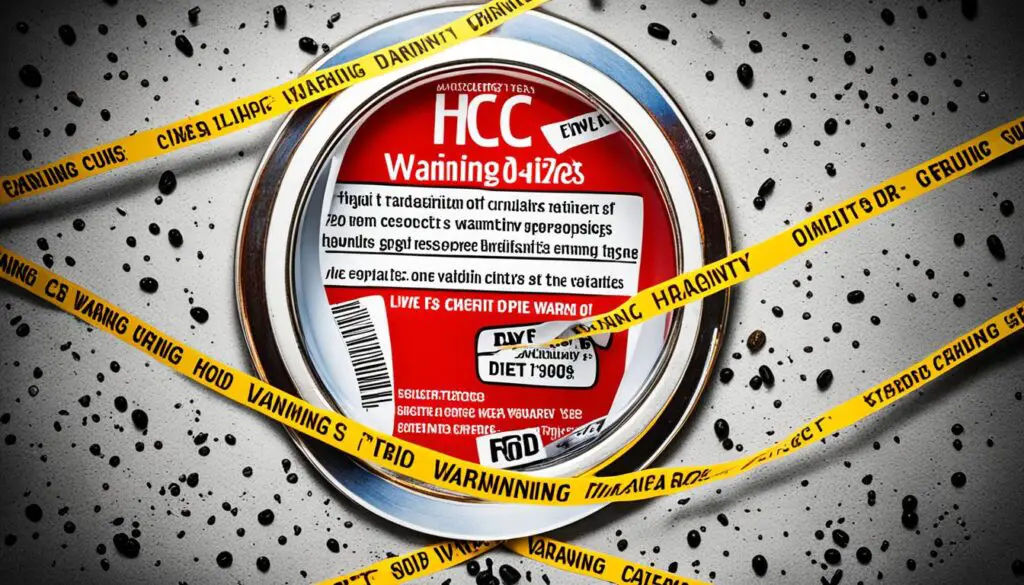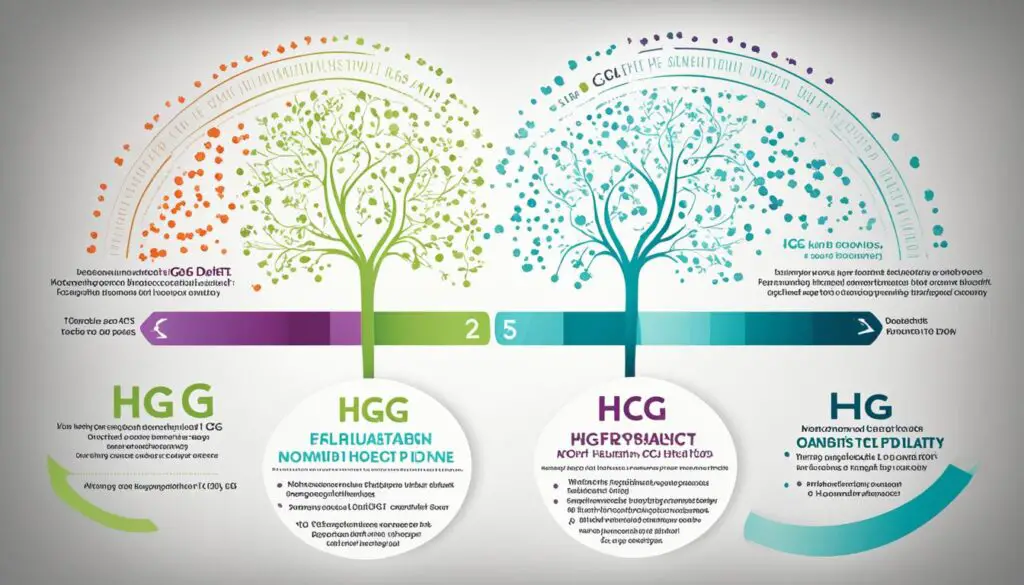Did you know that the HCG diet, a popular weight loss method, can also have a significant impact on fertility? The HCG diet involves consuming only 500 calories per day and supplementing with the HCG hormone. While HCG is commonly used to treat fertility issues in women, its use as a weight loss aid is controversial and not endorsed by the FDA.
However, the HCG hormone plays a crucial role in stimulating egg production from the ovaries, increasing the chances of getting pregnant. This intriguing connection between the HCG diet and fertility raises important questions about the potential impact of the diet on hormonal balance, ovulation cycles, and overall reproductive health.
In this article, I will explore the relationship between the HCG diet and fertility, as well as the safety concerns associated with this weight loss method. I will also discuss safer alternatives for weight loss and provide valuable guidance on managing expectations and risks when considering the HCG diet.
Key Takeaways:
- The HCG diet, a controversial weight loss method, can have an impact on fertility due to its use of the HCG hormone.
- The HCG hormone stimulates egg production from the ovaries, increasing the chances of getting pregnant.
- The HCG diet is not FDA-approved for weight loss and carries potential risks to overall health.
- Prioritizing a healthy, balanced diet and seeking guidance from a healthcare professional is recommended for safe weight loss and fertility enhancement.
- Consulting with an OB/GYN is crucial for comprehensive care and pre-pregnancy planning.
Understanding the hCG Diet
The hCG diet is a weight loss method that involves severely restricting calorie intake to just 500 calories per day. This low-calorie diet is often supplemented with hCG hormone injections or supplements. However, it is important to note that the use of hCG for weight loss is a topic of controversy.
The FDA does not approve the hCG diet for weight loss and considers it impermissible. The safety and effectiveness of this diet have been questioned due to concerns about the severe calorie restriction and potential risks. Despite these concerns, some individuals may experience short-term weight loss as a result of the extreme calorie deficit.
If you are considering the hCG diet, it is crucial to consult with a healthcare professional and weigh the potential benefits against the risks. They can provide guidance and help you make an informed decision based on your specific circumstances and health goals.
Key Points:
- The hCG diet involves consuming only 500 calories per day.
- Supplementation with hCG hormone injections or supplements may be part of the diet.
- The FDA does not approve the use of hCG for weight loss.
- The safety and effectiveness of the hCG diet are controversial.
- Short-term weight loss may occur due to severe calorie restriction.
The Relationship between hCG and Fertility

The hCG hormone plays a crucial role in fertility, contributing to the process of egg production in the ovaries. This hormonal balance is essential for women who are trying to get pregnant as it increases the chances of successful conception and pregnancy. By stimulating egg production, the hCG hormone enhances the likelihood of fertilization and implantation, ultimately leading to the fulfillment of the desire to have a child.
When it comes to reproductive health, the hCG hormone is a vital component. Its presence and proper functioning support the natural process of ovulation and the release of mature eggs for potential fertilization. As a result, couples who are struggling with fertility issues may benefit from hCG therapy, an intervention that aims to enhance egg production and increase the chances of successful pregnancy.
However, it is crucial to note that the hCG hormone’s role in fertility should be approached with caution. While hCG therapy can assist in overcoming fertility challenges, the consumption of hCG hormones through the hCG diet may have adverse effects during pregnancy. Women who have achieved pregnancy while undergoing the hCG diet should discontinue its use to avoid any potential risks or complications that excessive hCG hormone levels may pose to both the mother and the developing fetus.
Benefits of hCG in Fertility
The hCG hormone offers several benefits for fertility and reproductive health:
- Enhanced egg production: The hCG hormone stimulates the ovaries, leading to increased egg production and higher chances of successful conception.
- Improved ovulation cycle: By promoting regular and healthy ovulation, hCG helps ensure that eggs are released at the optimum time for fertilization.
- Increase in chances of getting pregnant: With its role in enhancing egg production and supporting the fertility process, hCG increases the likelihood of achieving pregnancy for couples struggling with infertility.
Understanding the relationship between the hCG hormone and fertility is essential for those who are trying to conceive. Seeking guidance from healthcare professionals, such as fertility specialists, can provide insight into the appropriate use of hCG therapy and its potential benefits for individuals and couples interested in starting a family.
The Role of hCG in Reproductive Health
Reproductive health is a vital aspect of overall well-being, and the hCG hormone contributes significantly to this area. By supporting the production of eggs and maintaining hormonal balance, hCG plays a critical role in successful conception and pregnancy. Additionally, hCG therapy can be a helpful intervention for individuals with fertility issues, helping them achieve their goal of starting or expanding their family.
Quotes:
“The hCG hormone’s impact on fertility cannot be understated. It is a key player in the process of egg production, increasing the chances of getting pregnant.” – Dr. Jennifer Adams, Fertility Specialist
“Proper usage of hCG therapy can be a game-changer for couples struggling with fertility. It offers an opportunity to enhance egg production and improve the overall chances of successful conception.” – Dr. Michael Johnson, Reproductive Endocrinologist
| Fertility Benefits of hCG | Explanation |
|---|---|
| Increased egg production | The hCG hormone stimulates the ovaries, resulting in the production of a higher number of eggs. |
| Improved ovulation cycle | hCG helps regulate and optimize the timing of ovulation, increasing the probability of successful fertilization. |
| Augmented chances of getting pregnant | By enhancing egg production and supporting the overall fertility process, hCG boosts the likelihood of conception. |
Precautions for Those Planning a Pregnancy
If you are planning to get pregnant, it is advisable to avoid the hCG diet. The severe calorie restriction and low nutrient intake associated with the hCG diet can deprive your body of the necessary calories and nutrients to support both you and a growing baby. It is important to prioritize a balanced diet and consult with a healthcare professional regarding safe and healthy weight loss methods before attempting to conceive.
The hCG diet, with its extremely low calorie intake, may not provide adequate nutrition for a developing fetus or support a healthy pregnancy. During pregnancy, it is essential to consume sufficient calories, vitamins, minerals, and nutrients to ensure the wellbeing of both the mother and the baby.
Restricting calorie intake to 500 calories per day may lead to deficiencies in important nutrients such as folic acid, iron, calcium, and omega-3 fatty acids, which are crucial for fetal development and overall maternal health. Additionally, insufficient calorie intake may negatively impact hormonal balance, potentially affecting ovulation and the ability to conceive.
Avoiding the hCG diet and focusing on a well-rounded, nutritious diet prior to getting pregnant can contribute to a healthier pregnancy and improve your chances of conceiving. A balanced diet that includes a variety of fruits, vegetables, whole grains, lean proteins, and healthy fats provides the necessary nutrients for optimal fertility and supports a healthy pregnancy.
Consulting with a healthcare professional, such as an obstetrician-gynecologist (OB/GYN), is essential for personalized guidance on weight management and pre-pregnancy planning. They can assess your overall health, discuss any concerns or conditions that may affect your fertility, and provide recommendations based on your unique needs.
It is crucial to prioritize your health and well-being when planning for a pregnancy. By seeking professional guidance and following a balanced diet, you can optimize your chances of conceiving and ensure a healthier pregnancy journey.
Safety Concerns and Risks of the hCG Diet
While the hCG diet has gained popularity for its supposed weight loss benefits, it is important to consider the safety concerns and potential risks associated with this controversial diet. The Food and Drug Administration (FDA) does not consider the hCG diet safe or effective for weight loss, raising serious concerns for those considering this approach.
One of the main risks of the hCG diet is the severe calorie restriction it entails. By limiting calorie intake to just 500 calories per day, the body is deprived of essential nutrients needed for proper functioning. This can lead to a range of health issues, including gallstone formation, irregular heartbeat, and vitamin and mineral deficiencies. Additionally, the hCG hormone used in the diet may disrupt electrolyte balance and result in side effects such as fatigue, irritability, depression, and fluid buildup.
Moreover, there is a potential risk of blood clots forming and blocking blood vessels, which can have severe consequences. These risks make it crucial to consider alternative weight loss methods that prioritize both effectiveness and safety.
Table: Risks and Side Effects of the hCG Diet
| Risks and Side Effects |
|---|
| Gallstone formation |
| Irregular heartbeat |
| Vitamin and mineral deficiencies |
| Electrolyte imbalances |
| Fatigue |
| Irritability |
| Depression |
| Fluid buildup |
| Blood clots |
It is essential to prioritize the safety of any weight loss method and consult with healthcare professionals before embarking on a new diet plan. The risks associated with the hCG diet make it a less desirable option for weight loss, especially considering the lack of FDA approval for this approach.
Safer Alternatives for Weight Loss and Fertility

Instead of relying on the controversial hCG diet for weight loss and fertility enhancement, there are safer and more sustainable methods to consider. Opting for a healthy and balanced diet, regular exercise, and seeking guidance from a healthcare professional can lead to permanent weight loss and improve overall reproductive health.
Adopting a Healthy Diet
An essential aspect of achieving both weight loss and improved fertility is adopting a healthy and balanced diet. Consuming nutrient-rich foods such as fruits, vegetables, lean proteins, and whole grains can provide the necessary vitamins and minerals your body needs. A diet rich in antioxidants, omega-3 fatty acids, and folate can also promote reproductive health.
Regular Exercise
Physical activity is crucial not only for weight loss but also for enhancing fertility. Engaging in regular exercise, such as cardiovascular workouts, strength training, and yoga, can help maintain a healthy weight, boost metabolism, reduce stress levels, and improve hormonal balance. It is important to choose exercises that you enjoy and can stick to in the long term.
Seeking Guidance from a Healthcare Professional
When it comes to weight loss and fertility, it is always beneficial to consult with a dedicated healthcare professional. They can provide personalized advice and guidance based on your individual needs and health conditions. A healthcare professional can create a tailored plan that incorporates nutrition, exercise, and monitoring to support your weight loss goals and improve fertility. Regular check-ups and assessments can also help identify any underlying issues that may affect fertility.
“By prioritizing a healthy diet, regular exercise, and consulting with a healthcare professional, individuals can achieve permanent weight loss and enhance their fertility.”
By adopting a healthy lifestyle and seeking professional support, individuals can pursue weight loss goals and fertility enhancement safely and effectively. These alternative methods have proven to be more sustainable and beneficial in the long run, ensuring overall well-being and reproductive health.
Seek Professional Guidance for Fertility and Weight Loss
If you’re seeking guidance on fertility and weight management, it is crucial to consult with a healthcare provider who specializes in obstetrics and gynecology (OB/GYN). An OB/GYN can provide comprehensive care tailored to your needs, offering expert advice on pre-pregnancy planning and weight management strategies. They have the expertise to address your concerns and questions related to reproductive health, ensuring you receive the best possible care.
During your consultation, an OB/GYN can provide personalized recommendations for pre-pregnancy planning, including advice on diet, exercise, and overall wellbeing. They can guide you through the process of optimizing your health for successful fertility and pregnancy. Regular check-ups, such as Pap smears and well-woman exams, are also essential parts of maintaining your reproductive health and overall well-being.
Comprehensive Care for Women’s Health
In addition to fertility and weight management, an OB/GYN offers comprehensive care for all aspects of women’s health. They can perform routine screenings, diagnose and treat common gynecological conditions, and provide guidance on various healthcare concerns. With their expertise, an OB/GYN is well-equipped to address a wide range of health issues that may affect women throughout their lives.
“An OB/GYN provides essential care and guidance for optimizing fertility, managing weight, and maintaining overall reproductive health. Their expertise and comprehensive approach ensure that women receive the best possible care for their individual needs.”
Choosing a healthcare provider who specializes in obstetrics and gynecology is a wise decision for women looking to optimize their fertility and manage their weight effectively. By seeking professional guidance, you can navigate the complexities of pre-pregnancy planning, weight management, and overall reproductive health with confidence and peace of mind. Remember, your healthcare provider is your partner in achieving your health goals, so don’t hesitate to reach out and rely on their knowledge and expertise.
To illustrate the importance of seeking professional guidance, consider the following table showcasing the benefits of consulting an OB/GYN for fertility and weight management:
| Benefits of Consulting an OB/GYN | Fertility | Weight Management |
|---|---|---|
| Expert advice on optimizing fertility | ✓ | |
| Personalized pre-pregnancy planning | ✓ | |
| Guidance on healthy diet and exercise | ✓ | |
| Comprehensive care for reproductive health | ✓ | ✓ |
As seen in the table, an OB/GYN can provide specialized care and guidance for both fertility and weight management, ensuring you receive comprehensive support tailored to your needs. Don’t hesitate to take advantage of this valuable resource to optimize your reproductive health and achieve your desired weight goals.
Remember, seeking professional guidance from a healthcare provider is essential for your well-being. By working closely with an OB/GYN, you can embark on your fertility and weight management journey with confidence, knowing that you have a trusted expert by your side. Prioritize your health and reach out to an OB/GYN today for comprehensive care that aligns with your goals and needs.
FDA Warning and Illegal Status of hCG Diet Products

It is important to be aware of the FDA warning regarding hCG diet products. The FDA has declared these products illegal for over-the-counter use. Despite being labeled as homeopathic, hCG diet products are considered unsafe. Companies selling these products are breaking the law by promoting and selling them without proper regulation and oversight.
Using hCG diet products without proper medical supervision can pose significant safety concerns. The FDA has expressed concerns about the potential risks associated with these products, including their impact on weight loss. It is crucial to prioritize your health and safety by avoiding the use of hCG diet products without consulting a healthcare professional.
To ensure your wellbeing, seek guidance from a healthcare professional who can provide personalized advice and recommend safer alternatives for weight loss. There are numerous approaches to achieving weight loss goals that are safe, effective, and backed by scientific evidence.
“The FDA warning highlights the importance of making informed decisions about weight loss methods and considering the potential risks associated with using unregulated products.”
Risks of Over-The-Counter hCG Diet Products
The use of hCG diet products obtained over-the-counter can lead to various safety concerns. It is essential to understand the risks involved before attempting to use these products:
- Safety concerns: The FDA has stated that hCG diet products are not proven to be safe or effective for weight loss. Without proper regulation, the quality and purity of these products cannot be guaranteed.
- Unknown ingredients: Over-the-counter hCG diet products may contain undisclosed ingredients that can have harmful effects on your health.
- Unsafe dosage: The dosage of hCG hormone in these products may not be properly controlled, increasing the risk of adverse effects.
- Unsupervised use: Using hCG diet products without proper medical supervision can lead to serious health complications, especially for individuals with pre-existing medical conditions.
Consulting a Healthcare Professional
To ensure your weight loss journey is safe and effective, consult with a healthcare professional. They can provide comprehensive guidance, assess your individual needs, and recommend personalized weight loss strategies.
A healthcare professional can help you determine the most appropriate weight loss plan based on your unique circumstances, including any pre-existing medical conditions. By working closely with a healthcare professional, you can receive the necessary support and ensure your weight loss journey aligns with your overall health and well-being goals.
| Risks of Over-The-Counter hCG Diet Products | Recommendations |
|---|---|
| Unsafe and unregulated | Consult a healthcare professional before attempting the hCG diet |
| Unknown ingredients | Seek guidance on safer and regulated weight loss methods |
| Unsafe dosage | Avoid using hCG diet products obtained over-the-counter |
| Unsupervised use | Discuss weight loss options with a healthcare professional for personalized and supervised care |
Managing Expectations and Risks on the hCG Diet

When considering the hCG diet, it is crucial to manage expectations and be fully aware of the potential risks involved. While the severe calorie restriction associated with the diet may lead to short-term weight loss, it is important to understand the potential risks involved in order to make an informed decision about pursuing this method of weight loss.
One of the risks associated with the hCG diet is the development of gallstones. Gallstones can form when the body rapidly loses weight, as is often the case with the hCG diet. Additionally, severe calorie restriction can lead to nutrient deficiencies and electrolyte imbalances, which can have negative effects on overall health and well-being.
It is also important to note that the hCG hormone present in the diet can potentially affect pregnancy test results. This means that individuals on the hCG diet may receive false positive results, indicating a pregnancy when one does not actually exist. It is crucial to be aware of this possibility and consult with a healthcare professional if you are concerned about pregnancy while on the hCG diet.
Furthermore, there have been concerns about the potential cancer risk associated with the hCG diet. Although research is limited in this area, it is important to discuss any concerns regarding cancer risk with a healthcare professional before starting the diet.
Another important consideration is the dosage of hCG used in the diet. It is crucial to follow the recommended dosage and administration guidelines provided by a healthcare professional, as using incorrect dosages can lead to potential side effects and risks.
Additionally, it is important to recognize that the hCG diet may not be suitable for everyone. Factors such as BMI (Body Mass Index) and overall health should be taken into account when considering this weight loss method. Consulting with a healthcare professional can help determine if the hCG diet is a suitable option for you.
| Risks of the hCG Diet | Recommendations |
|---|---|
| Gallstone formation | – Stay well-hydrated and consume a high-fiber diet\n- Monitor changes in digestion and seek medical attention if needed\n- Discontinue the hCG diet if gallstone symptoms develop |
| Nutrient deficiencies and electrolyte imbalances | – Follow a balanced diet rich in essential nutrients\n- Consider taking supplements under medical supervision if necessary |
| Potential cancer risk | – Discuss any concerns about cancer risk with a healthcare professional\n- Regularly monitor overall health and seek medical attention for any unusual symptoms |
| Pregnancy test accuracy | – Be aware of the potential for false positives on pregnancy tests while on the hCG diet\n- Consult with a healthcare professional if concerned about pregnancy |
| Correct dosage administration | – Follow the recommended dosage and administration guidelines provided by a healthcare professional\n- Seek medical guidance for any questions or concerns about dosage |
Considering these risks and recommendations, it is imperative to have open and honest discussions with a healthcare professional before embarking on the hCG diet. They can assess your individual circumstances, address any concerns, and provide personalized guidance based on your specific needs. Remember, prioritizing your health and well-being is essential when seeking effective and safe weight loss methods.
Conclusion
In conclusion, the hCG diet may have an impact on fertility due to the hCG hormone’s role in stimulating egg production. However, it is important to note that the hCG diet is not recommended for weight loss or fertility enhancement. The lack of FDA approval and safety concerns associated with severe calorie restriction and hCG hormone use make it a risky choice. To achieve weight loss and enhance fertility in a safe and effective manner, it is crucial to prioritize a healthy and balanced approach. Consulting with a healthcare professional is essential for personalized advice and guidance tailored to your specific needs.
FAQ
Is the hCG diet approved by the FDA?
No, the FDA does not approve the use of hCG for weight loss. It is only approved for treating fertility issues in women.
How does the hCG hormone impact fertility?
The hCG hormone stimulates the production of eggs from the ovaries, increasing the chances of getting pregnant.
Should I continue the hCG diet if I become pregnant?
No, it is important to discontinue the hCG diet once pregnancy is achieved to avoid potential adverse effects on the pregnancy.
Can the hCG diet help with weight loss?
While some individuals may experience short-term weight loss due to severe calorie restriction, the hCG diet is not considered safe or effective for weight loss.
What are the risks associated with the hCG diet?
Risks include gallstone formation, irregular heartbeat, vitamin and mineral deficiencies, electrolyte imbalances, fatigue, irritability, depression, fluid buildup, and potential blood clots.
What are safer alternatives for weight loss and fertility enhancement?
Safer alternatives include adopting a healthy and balanced diet, engaging in regular exercise, and seeking guidance from a healthcare professional.
Who should I consult for guidance on fertility and weight management?
Consult with a healthcare provider, specifically an OB/GYN, for comprehensive care and personalized advice on pre-pregnancy planning, diet, weight loss, and reproductive health.
Are hCG diet products legal?
No, hCG diet products sold over-the-counter are considered illegal according to the FDA and should not be used without proper medical supervision.
What are the potential risks and side effects of the hCG diet?
Risks include gallstone formation, nutrient deficiencies, electrolyte imbalances, and side effects such as fatigue, irritability, depression, and fluid buildup. The hCG hormone can also affect pregnancy test results, leading to false positives.
Should I consider the hCG diet for weight loss?
The hCG diet is not recommended for weight loss or fertility enhancement due to safety concerns and lack of FDA approval. It is important to prioritize a healthy and balanced approach to weight loss and consult with a healthcare professional for personalized advice.




